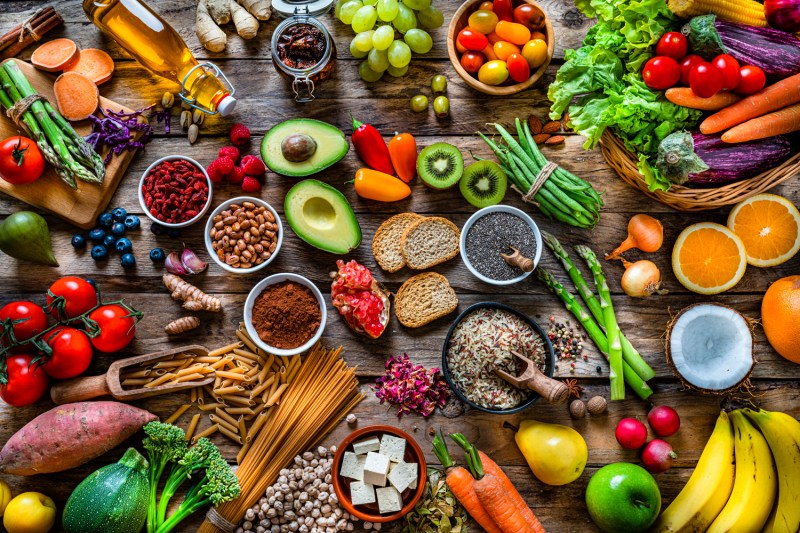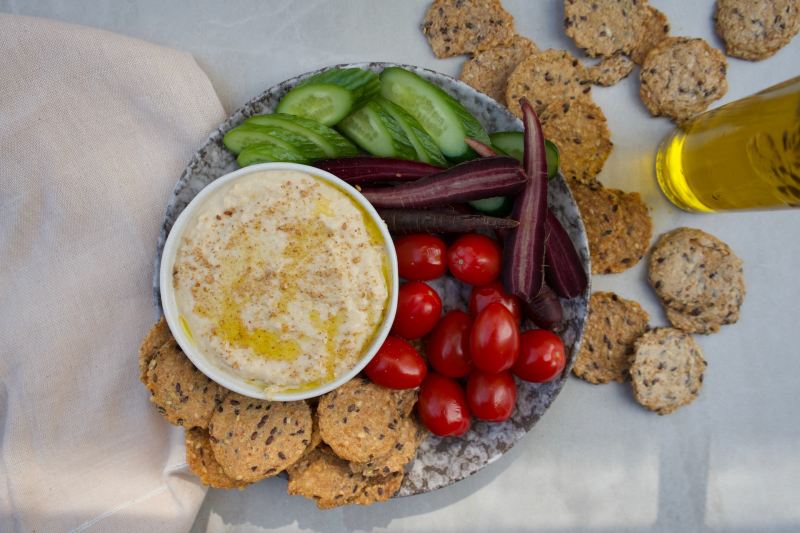If you’re trying the Mediterranean diet, you’re going to need recipes. Cooking for yourself is healthier, saves money, and can be fun! But how can you choose the best Mediterranean diet cookbook for beginners? We’ve looked at some of the most popular cookbooks for the Mediterranean diet to help you choose.
In this article, we’ll explain what the Mediterranean diet is, how you can follow it, and the health benefits of this diet plan. Plus, we’ll discuss the best cookbook (with some honorable mentions) and take a look at some of the great recipes it has to offer. Ready? Let’s get started!
What’s the Mediterranean diet?

The Mediterranean diet is based on the traditional foods grown and eaten around the Mediterranean Sea in countries like Greece, Spain, and Italy. It focuses on whole, unprocessed foods, emphasizing fruits and vegetables, lean proteins like chicken and fish, and healthy fats like olive oil, nuts, and avocados. People on the Mediterranean diet avoid highly processed and artificially sweetened foods.
What are the top 10 foods on a Mediterranean diet?

- Olive oil: This is the cornerstone of the Mediterranean diet. Any food cooked in oil is always cooked in olive oil, and it’s often drizzled on top of other dishes, as if it’s a condiment. Look for a really good olive oil since you’ll be using it as much for its flavor as for cooking.
- Fruit: Figs, citrus, and berries are the stars of many recipes. Dates, plums, grapes, and dried fruit like raisins are also extremely common in Mediterranean cuisine.
- Vegetables: Think of avocado, artichoke, eggplant, zucchini, mushrooms, and colorful bell peppers. The greater the variety, the better.
- Leafy greens: From romaine to kale, leafy greens can be found in salads, omelets, and pastas. Spinach is particularly popular. This category also includes lots of fresh herbs, like dill, mint, and fennel.
- Whole wheat: Wheat is often discouraged in many diets, but it’s encouraged in the Mediterranean diet. You can even try whole-wheat bread and pancakes.
- Fish: Salmon is the most common fish in Mediterranean recipes, but all kinds of fish are part of this diet, from tuna and tilapia to swordfish steaks. These are usually eaten sparingly, as the main focus of the Mediterranean diet is vegetables and whole grains.
- Seafood: Everything in the ocean that isn’t a fish. Anything from scallops and lobster to octopus is welcome into the Mediterranean diet. Again, these are less of a focus than the veggies and grains.
- Dairy and eggs: Popular dairy options are feta cheese and Greek yogurt. Milk is not usually consumed. Eggs are often served with vegetables, such as in omelets or scrambled eggs.
- Quinoa: High in protein and nutrients, low in calories, and easy to cook, quinoa is a superstar. It’s not native to the Mediterranean region; instead, it comes from the Andes in South America, but it fits a similar nutritional profile to the other whole grains common in the Mediterranean diet.
- Beans, legumes, and nuts: Chickpeas are one of the most common types of beans used in recipes like hummus and falafel, but many kinds of beans are welcome here. Nuts are often sprinkled on Greek yogurt for a quick breakfast.
The best Mediterranean diet cookbook for beginners

The best Mediterranean diet cookbook is easily
Buy at Amazon
from America’s Test Kitchen. It includes over 500 recipes, so you’ll never run out of healthy food ideas. It also includes very basic
Honorable mentions go to Buy at Amazon , by Serena Ball and Deanna Segrave-Daly, for high-quality recipes that avoid food waste and to Buy at Amazon , by Erika Simons, which is excellent for newbies to the Mediterranean diet but not to the kitchen. Both books would be great contributions to your shelf, but they can’t match The Complete Mediterranean Cookbook for its encyclopedic scale.
Top recipes we recommend from this book
Classic hummus
You can’t go wrong! They’ve thoroughly tested several methods and described the pitfalls that can lead your hummus to turn grainy or mushy. Plus, there are four variants, from roasted garlic hummus to artichoke-lemon hummus, that are sure to turn heads.
Panzanella salad with white beans and arugula
Panzanella means crusty, stale bread — basically croutons. This recipe takes whole-wheat bread and tosses it together with tomatoes, cannellini beans, olive oil, arugula, and lots and lots of herbs.
Indoor paella
This simplified paella uses a Dutch oven instead of a paella pan and an oven instead of a grill, but it maintains the essence of the dish. It even includes an optional step to create a socarrat, the crusty layer of rice that forms on the bottom of the pan in a traditional paella.
Roasted asparagus
A simple, easy, and crispy dish, this also includes two recipes for a gremolata to serve alongside. Many of the dishes, especially vegetable dishes, come with variations in this cookbook.
Grilled sea bass with citrus and black olive salad
This sounds like an incredibly complex recipe, but it actually comes together in under 45 minutes, although it does require a grill.
3 health benefits of consistently following the Mediterranean diet

Heart health
This is one of the most studied benefits of the Mediterranean diet. Scientific reviews show a wide variety of beneficial effects on cardiovascular health, including reducing the risk of heart disease and strokes and minimizing the severity of such conditions if they do occur.
Weight loss
Being overweight or obese is a serious risk factor for a variety of diseases, from cardiovascular diseases and diabetes to COVID-19 complications. Studies have found that strictly following the Mediterranean diet often results in significant weight loss, reducing your disease risk and getting you closer to the body you want.
Brain function
This benefit is still the subject of ongoing research, but a few studies have shown a correlation between following the Mediterranean diet and improved mental function in elderly adults. This may be because of the healthy fats, especially from foods like fish and avocado, but research is still being conducted.
Frequently asked questions

How much weight can you lose in 30 days on the Mediterranean diet?
The CDC recommends losing 1 to 2 pounds per week for healthy, sustainable weight loss. That’s easily achievable on the Mediterranean diet, as long as you aren’t overeating. Adhering to the diet for over 30 days could lead to losing up to 8 pounds!
What are the two most recognized ingredients in the Mediterranean diet?
Olive oil is definitely one of the cornerstones of the Mediterranean diet. The diet is also known for its emphasis on seafood, although you should know that the Mediterranean diet focuses more on vegetables than on any kind of meat.
What isn’t allowed on a Mediterranean diet?
Highly processed foods are not recommended on a Mediterranean diet. The diet isn’t strict about them being “not allowed,” but you’re encouraged to choose whole foods instead wherever possible. Artificial sweeteners, especially sweetened beverages, are also discouraged.




